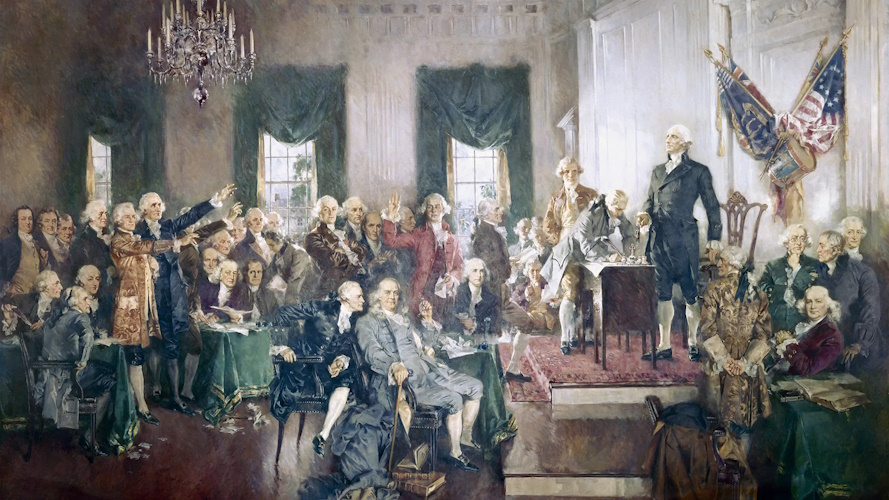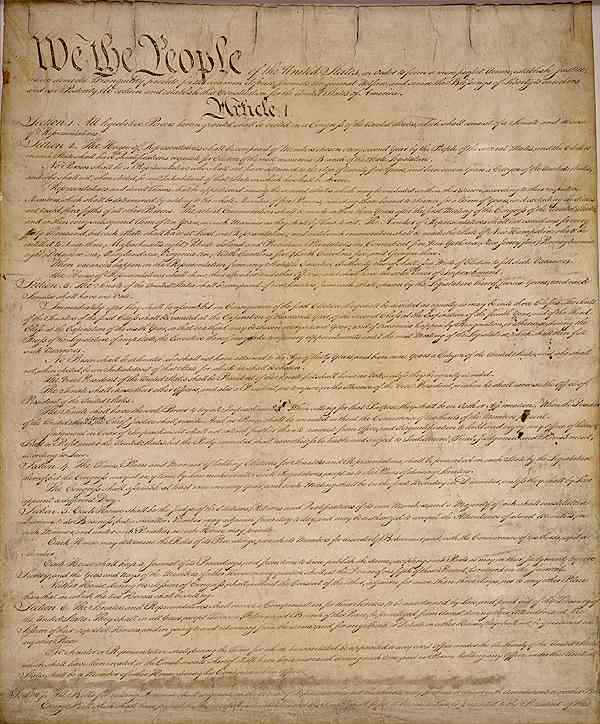
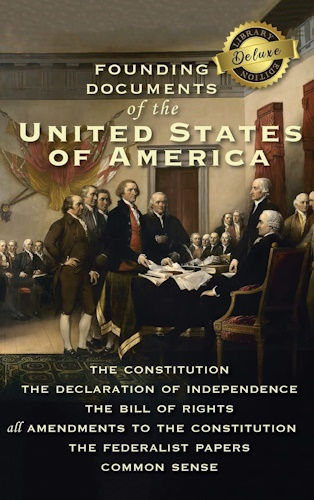
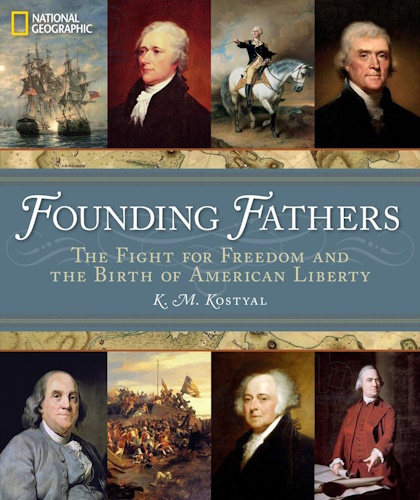
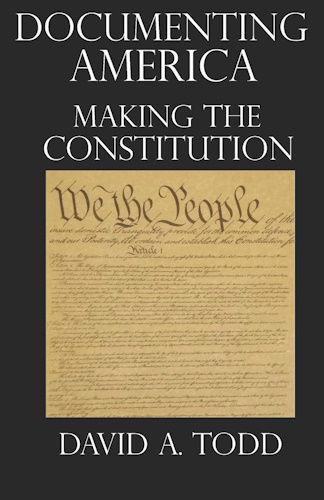


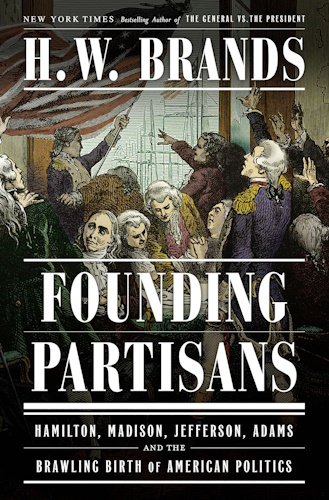
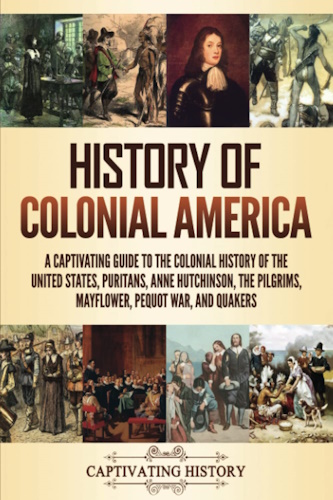
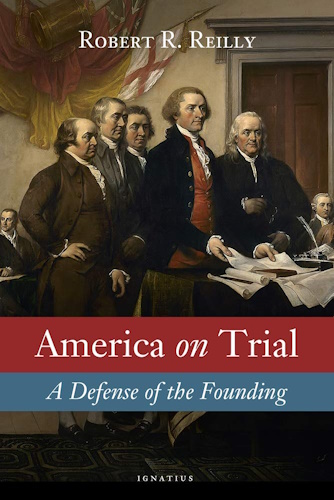
The Constitution For The United States
Its Sources and Its Application
by Thomas James Norton
(Retrieved from archive.org)
The research, work, and dedication
Of
Barefoot Bob Hardison
August 8th, 1933 - January 31st, 2009
![]()
The Constitution For The United States
Its Sources and Its Application
Contents
Preamble
Article 1
Article 2
Article 3
Article 4
Article 5
Article 6
Article 7
Ratification
1st 12 Amendment Proposals
"Bill of Rights" Amend. I - X
Amend. XI -XXVII
Missing Original 13th Amendment
Letter of Transmittl
Landmark Court - Case Index
Constitution History
A Quiz for Loyal Americans
Index
Article IV
Section 1. Full Faith and Credit shall be given in each State to the public Acts, Records, and judicial Proceedings of every other State. 117
117 This is a command to the States which they must obey. It is another of the nationalizing clauses of the Constitution. "The public acts (that is, the laws], records and judicial proceedings" (judgments and decrees of courts) of one State must be given in every other State "the force and effect to which" they are "entitled in the State where rendered." Thus a copy (properly authenticated or proved) of a judgment against a man for money, obtained in a court of the State of New York, may be presented to a court in California (the defendant having moved to the latter State, perhaps to escape the obligation) and a judgment will be there entered against him and enforced as it would have been in New York had he remained there. It is not necessary again to bear the trouble and expense of bringing witnesses and proving a case.
Substantially the same language was in a resolution passed in 1777 by the Continental Congress, and it reappeared in the Articles of Confederation. The first Congress under the Constitution passed an act (May 26, 1790) to effectuate this clause by prescribing how records should be authenticated and declaring that they should have' such faith and credit in every State as they had in the State from which they were taken.
Full faith and credit was held by the Supreme Court of the United States (1903) not to have been denied by the courts of Massachusetts in permitting the first wife of a man, rather than the second, to administer his estate upon his death, as the law of Massachusetts made invalid in that State a divorce which he went to South Dakota to procure. Full faith and credit did not require that a decree of divorce granted in South Dakota should be respected and made operative against the public policy of Massachusetts. c91
And the Congress may by general Laws prescribe the Manner in which such Acts, Records and Proceedings shall be proved, and the Effect thereof. 118
118 Thus an Act of Congress provides that an act of a legislative body is authenticated for use in another State "by having the seal of such Territory, State, or country affixed thereto." A copy of a judgment or decree of court rendered in any State "shall be proved or admitted in any other court within the United States by the attestation of the clerk and the seal of the court annexed, if there be a seal, together with a certificate of the judge . . . that the said attestation is in due form."
Section 2. The Citizens of each State shall be entitled to all Privileges and Immunities of Citizens in the several States. 119
119 Provisions of this kind were in the colonial charters. The colonists of Virginia, for example, who received (1606) the first charter from the English sovereign, were by that writing guaranteed "all liberties, franchises and immunities within any of our dominions to all intents and purposes as if they had been abiding and born within this our realm of England."
"The better to secure and perpetuate mutual friendship and intercourse among the people of the different States in this Union," ran the Articles of Confederation, "the free inhabitants of each of these States (paupers, vagabonds and fugitives from justice excepted) shall be entitled to all the privileges and immunities of free citizens in the several States."
A citizen of one State going to or transacting business in another is entitled in the latter State to the privileges and immunities enjoyed by its citizens. The State cannot legislate against him or otherwise disfavor him. The intent was that the citizen of one State should not be an alien in another. In any State he has the protection of the government of that State, the enjoyment of life and liberty with the right to acquire and possess property, the right to pursue and obtain happiness, to institute actions in court, and generally to possess what the citizen of the State possesses. Numerous cases have arisen under this clause where States have attempted to favor their own citizens to the prejudice of the citizens of other States. Such laws are void for conflict with this clause.
After the Negro was emancipated there was adopted the Fourteenth Amendment (1868), one of the provisions of which172 is that "no State shall . . . abridge the privileges or immunities of citizens of the United States." Thus, putting the two clauses together, the State is forbidden to abridge the privileges and immunities of (1) the citizen of another State, and of (2) the citizen of the United States. For there are two citizenships and two loyalties. c88
A State cannot take away the right of citizens of other States to sue in the Federal courts of that State. This clause was held not to warrant an act of Congress prescribing punishment of persons for conspiring to deprive others (liberated Negroes) of equal privileges or immunities, as the guaranty of the Constitution is against wrongs done by States and not by persons. Wrongs done in a State by persons must be dealt with by the State in the exercise of its police power, and not by the Nation.c18
A Person charged in any State with Treason, Felony, or other Crime, who shall flee from Justice, and be found in another State, shall on demand of the executive Authority of the State from which he fled, be delivered up, to be removed to the State having Jurisdiction of the Crime. 120
120 This returning of a fugitive charged with crime to the place of his misdeed for trial is called interstate extradition. International extradition was probably aided in development by the practical operation of this clause. It was more than half a century after it was written in 1787 that England entered into a treaty of extradition (1842) with the United States. This was followed from time to time by treaties among leading countries. Previously to those treaties a fugitive too often found safety in a foreign country, although sometimes a government would surrender a fugitive as a matter of courtesy. Thus Spain delivered to the United States for trial a fugitive who had been indicted (1871) for taking the funds of the City of New York.
The "shall . . . be delivered up" in this clause is not mandatory. Congress has provided no remedy should a State refuse to deliver, and there have been many instances of refusal where, in the opinion of the Governor, substantial justice did not require surrender. The Governor of Ohio refused (1860) to deliver to Kentucky a man charged with aiding the escape of a slave, and the Supreme Court of the United States held that the Act of Congress of 1793, passed under this clause, declaring it to be the duty of a State to deliver upon a sufficient showing, was not mandatory. Therefore, a Federal court would not issue a mandate to compel the governor to obey. c45
The State will not deliver the fugitive until it has examined the record against the accused and found it regular and legal. If it appears that the proceeding was brought to force a settlement of a private demand, or to bring back the accused to be tried on some other charge, or otherwise to misuse legal writ or process, the application will be denied. And even after the State has determined to surrender the fugitive, he may secure, by the writ of habeas corpus, a hearing in court as to whether, on the record exhibited against him, he is legally restrained of his liberty. c45
One who while a fugitive commits an offence against the laws of the asylum State must stand trial there before being surrendered, and if convicted must serve sentence. To be a fugitive within the meaning of this clause it is enough to have left the demanding State after having committed a crime. One who goes into another State and commits a crime and then returns home is a fugitive. To be "charged" with crime within the language of the clause so as to warrant extradition one must be accused by a person having knowledge of the offence and stating it under oath; or if he has been convicted in the demanding State, then a record of the trial must be submitted to the Governor of the asylum State.
It is the duty of the Federal courts to see that this power be not extended to fields and exercised in classes of cases not clearly within the Constitution.
The "felony or other crime" of this clause includes any indictable offence under the present laws of the demanding State -- that is, it is not limited to the offences known to the common law at the time the Constitution was adopted.
The governor of the asylum State should not attempt to pass upon the guilt of the accused -- it is enough to determine that an extraditable offence has been regularly charged.
The international rule of treaty, that a fugitive surrendered by a foreign country cannot, on being taken home, be tried for an offence not embraced in the demand, does not generally apply to interstate extraditions under this clause, although some of the States follow that rule. c45
Where a criminal who had fled to another State was taken back forcibly without extradition papers, the Supreme Court of the United States held that the governor of the asylum State had no authority under the Constitution to demand his return, a fugitive having no right to asylum in any State. c45
A person may be arrested and detained for a reasonable time by the asylum State in order that the other State may prepare papers and make a demand.
No Person held to Service or Labor in one State, under the Laws thereof, escaping into another, shall, in Consequence of any Law or Regulation therein, be discharged from such Service or Labor, but shall be delivered up on Claim of the Party to whom such Service or labor may be due. 121
121 This is the last of the three 11, 61 compromises respecting slavery. Time has made it obsolete. It related to the fugitive slave. It was designed to over come the decision (1772) of Lord Mansfield, Chief Justice of the King's Bench, fifteen years before in the celebrated case of the Negro, Somerset, that a slave brought by his master from Virginia to England became free. This was held notwithstanding that slavery was common then in the English colonies and that traffic in slaves was one of the foremost of English activities in trade, To apply that principle in America would liberate the slave who might flee to a northern State. Therefore this protecting clause was necessary to secure from the slave-holding States their ratification of the Constitution. c99
In 1793 Congress effectuated this clause by "An Act Respecting Fugitives from Justice and Persons Escaping from the Service of Their Masters." In 1850, when the rumblings of the coming Civil War were rising, Congress passed another Fugitive Slave Law requiring, among many things "all good citizens" to "aid in the prompt and efficient execution of this law," and authorizing officers "to summon and call to their aid the bystanders." In a case arising in Wisconsin, in which a man was charged with aiding in the escape of a fugitive slave in violation of this Act, it was held (1858) by the Supreme Court that under this clause Congress had authority to enact the Fugitive Slave Law.
"I say that the South has been injured in this respect," said Daniel Webster of Massachusetts in the Senate in 1850, "and has a right to complain; and the North has been too careless of what I think the Constitution peremptorily and emphatically enjoins upon her as a duty." c53
Many northern States enacted laws to aid the fugitive slave. Although the Ordinance of the Congress under the Articles of Confederation creating the Northwest Territory -- reenacted by the first Congress (August 7, 1789) under the Constitution -- forbade slavery, it nevertheless provided for the return of fugitive slaves to their owners.
Section 3. New States may be admitted by the Congress into this Union;122
122 Even before the Constitution, provision was made for the admission of new States. The Ordinance (1787) of the Congress under the Articles of Confederation which created the Northwest Territory provided for a temporary government until the population should reach five thousand, when a representative would be admitted to Congress; and when the population should reach sixty thousand a State would be admitted to remain in the Union forever, upholding a republican form of government, and prohibiting slavery. The Articles of Confederation provided (Art. XI) that "Canada, acceding to this Confederation, and joining in the measures of the United States, shall be admitted into and entitled to all the advantages of this Union; but no other colony shall be admitted into the same unless such admission be agreed to by nine States."
For nearly four years (November 17, 1777, to March 1, 1781) the adoption of the Articles of Confederation was delayed by a dispute over the lands lying west of the original colonies. The grants from the crown had extended to the west indefinitely. They were intercepted at the Mississippi by claims to that valley based on French explorations. Thus Virginia claimed what afterward became West Virginia, Kentucky, and also the greater part of Ohio, Indiana, and Illinois, and part of northern Michigan, Wisconsin, and Minnesota. Jumping across eastern New York to Oswego and a line thence south, Massachusetts claimed western New York and what later became the lower half of Michigan and the lower half of Wisconsin. Connecticut claimed what is now the northern, part of Ohio, Indiana, and Illinois. North Carolina, South Carolina, and Georgia extended to the Mississippi. Some of the landless States, notably Maryland, contended that as those lands had been wrested from English dominion by common endeavor and sacrifice, they should become the property of the Union and not go to the enrichment of a few States. They finally carried their point. New York, which claimed but little, and Virginia, with a vast area, led the way (1781) by ceding their lands, and the others followed. Immediately Maryland, which had blocked the way, ratified the Articles of Confederation and they went into operation as successor to the provisional government maintained by the Continental Congress. That Congress had promised by resolution the year before (October 10, 1780) that lands which might be ceded to the Union by the State would be "disposed of for the common benefit of the United States," and also that they would be "settled and formed into distinct republican States which shall become members of the Federal Union."
Later (1803, by the Louisiana Purchase from Napoleon of France, the vast territory between the Mississippi and the Rocky Mountains was added by President Jefferson to the domain. In 1819 Florida was secured by President Monroe from Spain. Texas was admitted (1845) in the term of President Polk. The war with Mexico (1846-1847) was followed by the purchase from that country by President Polk of the region west of the Rocky Mountains for $15,000,000 in cash and the assumption by the United States of all debts owing from the Mexican Government to American citizens, not to exceed $3,500,000. In 1867 Alaska was purchased of Russia for $7,200,000 by President Johnson, and following the war with Spain (1898) Puerto Rico and the Philippines came under the dominion of the United States during the term of President McKinley.
Usually the people of a Territory have adopted a constitution and submitted it to Congress for approval. When all conditions have been satisfactory Congress has passed an act admitting the Territory as a State. The admission of Utah was once denied because of local religious customs. Many conditions were imposed by Congress after the Civil War upon the right of returning States to representation in Congress, such as the repudiation of the debt of the Confederacy, and the permission of the Negro to vote.
but no new State shall be formed or erected within the Jurisdiction of any other State;123
123 But in the case of what is now West Virginia, the people of which remained loyal during the Civil War, Congress decided that the part remaining loyal "might maintain a loyal State for the government of the whole State," and that government could give its consent to the erection of a new State within the limits of the old, which was done.
The territory of Vermont, the first State to be admitted into the Union (March 4, 1791), was claimed by both New York and New Hampshire; but as the claim was never maintained by either State, the admission of Vermont was not the erection of a new State "within the jurisdiction of any other State," prohibited by the foregoing clause.
The joint resolution of Congress (March 1, 1845) "for annexing Texas to the United States" authorized the creation of "new States, of convenient size, not exceeding four in number, in addition to said State of Texas."
nor any State be formed by the Junction of two or more States, or parts of States, without the Consent of the Legislatures of the States concerned as well as of the Congress. 124
124 "The particular precaution against the erection of new States by the partition of a State without its consent," wrote Alexander Hamilton, "quiets the jealousy of the larger States, as that of the smaller is quieted by a like precaution against a junction of States without their consent."
The Congress shall have Power to dispose of and make all needful Rules and Regulations respecting the Territory or other Property belonging to the United States;125
125 Under this power Congress has erected Territories out of the public domain, provided for the government of them (usually by an elective legislature and an appointive executive and judiciary) until they were ready for statehood, and admitted them to the Union upon their presenting satisfactory constitutions for a republican form of government. Many Territories so governed grew populous and prosperous. Indeed, the opinion has been expressed by many residents of Territories that the territorial form of government is less expensive than that of a State and otherwise preferable to it. Part of the expenses of a Territorial government are paid by the National treasury. But. as the governor and the other executive officers are appointed by the President and the people have no vote in National elections, the desire for home rule and participation in National affairs has outweighed all such benefits of Territorial government.
and nothing in this Constitution shall be so construed as to Prejudice any Claims of the United States, or of any particular State. 126
126 "The proviso annexed is proper in itself," wrote Madison, "and was probably rendered absolutely necessary by jealousies and questions concerning the western territory sufficiently known to the public." At the time the Constitution was drafted, North Carolina and Georgia had not ceded to the Nation their western lands.
Section 4. The United States shall guarantee to every State in this Union a Republican Form of Government,127 and shall protect each of them against Invasion;
127 "In the light of the undoubted fact that by the Revolution it was expected and intended to throw off monarchical and aristocratic forms," says Cooley ("Principles of Constitutional Law"), "there could be no question but that by a republican form of government was intended a government in which not only would the people's representatives make the laws and their agents administer them, but the people would also directly or indirectly choose the executive."
This clause requires the Nation to protect the State from invasion by a foreign power, and also from domestic insurrection 57. like the Dorr Rebellion, in Rhode Island, when the President announced that should it be necessary he would support the older government.
What is a republican form of government or whether one exists in a State is determinable by the political power (legislative) of the United States and not by the judicial This question arose out of the Dorr Rebellion (1842), when persons in the military service of the State broke into and searched the rooms of persons who were in insurrection. In an action for damages brought by persons whose rooms had been entered, the defendants justified on the ground that as officers of the State they were helping it defend itself from insurrection under the declaration by it of martial law. The plaintiff rejoined that the former State government "had been displaced and annulled by the people of Rhode Island" and that the persons who were said to be in insurrection and whose houses were broken into were in fact "engaged in supporting the lawful authority of the State." In a decision written by Chief Justice Taney in 1848 it was said that in forming the constitutions of the different States after the Declaration of Independence and in the various changes and alterations which had since been made, "the political department has always determined whether the proposed constitution or amendment was ratified or not by the people of the State, and the judicial power has followed its decision." c97
In 1867 the State of Georgia filed a bill for injunction in the Supreme Court of the United States against Edwin M. Stanton, Secretary of War, General Grant, and Major General Pope, to restrain them from carrying out the provisions of the Reconstruction Acts of Congress96 for maintaining order in the southern States and holding elections for the adoption of new constitutions. The bill for injunction recited that Major General Pope had been placed in command of the military district in which Georgia was situated for the purpose of carrying out these Acts of Congress, although at the close of the war military forces had been withdrawn and the civil government of the State had been revived and reorganized with the consent of the President as Commander in Chief of the army, all that was lacking for complete rehabilitation being representation in the Senate and the House of Representatives. The Supreme Court dismissed the bill for want of jurisdiction, saying that its authority related to "the rights of persons or property, not merely political rights, which do not belong to the jurisdiction of a court, either in law or equity." c59
In 1912 a tax-payer in Oregon brought this question again to the attention of the Supreme Court, claiming that the amendment of 1902 to the constitution of Oregon, by which the people reserved to themselves the right to propose amendments to the Constitution and to enact or reject at the polls laws or amendments independent of the legislative assembly, had destroyed the republican form of government which had been guaranteed by this section of the National Constitution. It was contended that such government by the people directly is democracy and not the representative or republican form which the framers of the Constitution had in mind. The Supreme Court said that the questions presented "have long since by this court been definitely determined to be political and governmental and embraced within the scope of the powers conferred upon Congress, and not therefore within the reach of the judicial power."
and on Application of the Legislature, or of the Executive (when the Legislature cannot be convened) against domestic Violence. 128
128 The President is to determine when "domestic violence" warrants his sending troops to a State. The Nation will not act as a policeman. Where a State had no militia with which to preserve order the President sent troops upon the call of the governor (the legislature not being in session), but then the President insisted that the legislature must sit and make preparations without delay so that he might withdraw the troops. During the disorders of a country-wide railway strike in 1894, which, in Chicago, interfered with the transportation of United States mail, President, Cleveland sent troops to maintain order not only without the request of the Governor of Illinois, but also against his protest. Under the clause51 putting post offices and post roads in the care of the Nation the Federal Government could take any steps necessary anywhere to keep the post roads open.
During Dorr's Rebellion in Rhode Island in 1842, when two rival organizations were claiming to be the legal government, Governor King of the older government called upon President Tyler for assistance. The President said that he hoped that intervention might not be necessary for the restoration of order, but that he would "not be found to shrink from the performance of a duty which, while it would be the most painful, is at the same time the most imperative." As between the contending parties, he said that it would be his duty "to respect the requisition of that government which had been recognized as the existing government of the State through all time past until I shall be advised, in regular manner, that it has been altered and abolished and another substituted in its place by legal and peaceable proceedings." That declaration virtually ended the rebellion.
In the Constitutional Convention there was much discussion and revision before this clause was finally so nicely balanced between National and State authority.
![]()
![]()
![]()
Disclaimer:
Some material presented will contain links, quotes, ideologies, etc., the contents of which should be understood to first, in their whole, reflect the views or opinions of their editors, and second, are used in my personal research as "fair use" sources only, and not espousement one way or the other. Researching for 'truth' leads one all over the place...a piece here, a piece there. As a researcher, I hunt, gather and disassemble resources, trying to put all the pieces into a coherent and logical whole. I encourage you to do the same. And please remember, these pages are only my effort to collect all the pieces I can find and see if they properly fit into the 'reality aggregate'.
Personal Position:
I've come to realize that 'truth' boils down to what we 'believe' the facts we've gathered point to. We only 'know' what we've 'experienced' firsthand. Everything else - what we read, what we watch, what we hear - is what someone else's gathered facts point to and 'they' 'believe' is 'truth', so that 'truth' seems to change in direct proportion to newly gathered facts divided by applied plausibility. Though I believe there is 'truth', until someone representing the celestial realm visibly appears and presents the heavenly records of Facts And Lies In The Order They Happened, I can't know for sure exactly what "the whole truth' on any given subject is, and what applies to me applies to everyone. Until then I'll continue to ask, "what does The Urantia Book say on the subject?"
~Gail Bird Allen
![]()
![]()








-
Urantia Book, 44:0.11 - The Celestial Artisans
Never in your long ascendancy will you lose the power to recognize your associates of former existences. Always, as you ascend inward in the scale of life, will you retain the ability to recognize and fraternize with the fellow beings of your previous and lower levels of experience. Each new translation or resurrection will add one more group of spirit beings to your vision range without in the least depriving you of the ability to recognize your friends and fellows of former estates.
-
Princess Bride 1987 Wallace Shawn (Vizzini) and Mandy Patinkin (Inigo Montoya)
Vizzini: HE DIDN'T FALL? INCONCEIVABLE.
Inigo Montoya: You keep using that word. I do not think it means what you think it means. -
Urantia Book, 117:4.14 - The Finite God
And here is mystery: The more closely man approaches God through love, the greater the reality -- actuality -- of that man. The more man withdraws from God, the more nearly he approaches nonreality -- cessation of existence. When man consecrates his will to the doing of the Father's will, when man gives God all that he has, then does God make that man more than he is.
-
Urantia Book, 167:7.4 - The Talk About Angels
"And do you not remember that I said to you once before that, if you had your spiritual eyes anointed, you would then see the heavens opened and behold the angels of God ascending and descending? It is by the ministry of the angels that one world may be kept in touch with other worlds, for have I not repeatedly told you that I have other sheep not of this fold?"
-
Urantia Book, Foreword - 0:12.12 - The Trinities
But we know that there dwells within the human mind a fragment of God, and that there sojourns with the human soul the Spirit of Truth; and we further know that these spirit forces conspire to enable material man to grasp the reality of spiritual values and to comprehend the philosophy of universe meanings. But even more certainly we know that these spirits of the Divine Presence are able to assist man in the spiritual appropriation of all truth contributory to the enhancement of the ever-progressing reality of personal religious experience—God-consciousness.
-
Urantia Book, 1:4.3 - The Mystery Of God
When you are through down here, when your course has been run in temporary form on earth, when your trial trip in the flesh is finished, when the dust that composes the mortal tabernacle "returns to the earth whence it came"; then, it is revealed, the indwelling "Spirit shall return to God who gave it." There sojourns within each moral being of this planet a fragment of God, a part and parcel of divinity. It is not yet yours by right of possession, but it is designedly intended to be one with you if you survive the mortal existence.
-
Urantia Book, 1:4.1 - The Mystery Of God
And the greatest of all the unfathomable mysteries of God is the phenomenon of the divine indwelling of mortal minds. The manner in which the Universal Father sojourns with the creatures of time is the most profound of all universe mysteries; the divine presence in the mind of man is the mystery of mysteries.
-
Urantia Book, 1:4.6 - The Mystery Of God
To every spirit being and to every mortal creature in every sphere and on every world of the universe of universes, the Universal Father reveals all of his gracious and divine self that can be discerned or comprehended by such spirit beings and by such mortal creatures. God is no respecter of persons, either spiritual or material. The divine presence which any child of the universe enjoys at any given moment is limited only by the capacity of such a creature to receive and to discern the spirit actualities of the supermaterial world.
-
Urantia Book, 11:0.1 - The Eternal Isle Of Paradise
Paradise is the eternal center of the universe of universes and the abiding place of the Universal Father, the Eternal Son, the Infinite Spirit, and their divine co-ordinates and associates. This central Isle is the most gigantic organized body of cosmic reality in all the master universe. Paradise is a material sphere as well as a spiritual abode. All of the intelligent creation of the Universal Father is domiciled on material abodes; hence must the absolute controlling center also be material, literal. And again it should be reiterated that spirit things and spiritual beings are real.
-
Urantia Book, 50:6.4 - Planetary Culture
Culture presupposes quality of mind; culture cannot be enhanced unless mind is elevated. Superior intellect will seek a noble culture and find some way to attain such a goal. Inferior minds will spurn the highest culture even when presented to them ready-made.
-
Urantia Book, 54:1.6 - True And False Liberty
True liberty is the associate of genuine self-respect; false liberty is the consort of self-admiration. True liberty is the fruit of self-control; false liberty, the assumption of self-assertion. Self-control leads to altruistic service; self-admiration tends towards the exploitation of others for the selfish aggrandizement of such a mistaken individual as is willing to sacrifice righteous attainment for the sake of possessing unjust power over his fellow beings.
-
Urantia Book, 54:1.9 - True And False Liberty
How dare the self-willed creature encroach upon the rights of his fellows in the name of personal liberty when the Supreme Rulers of the universe stand back in merciful respect for these prerogatives of will and potentials of personality! No being, in the exercise of his supposed personal liberty, has a right to deprive any other being of those privileges of existence conferred by the Creators and duly respected by all their loyal associates, subordinates, and subjects.
-
Urantia Book, 54:1.8 - True And False Liberty
There is no error greater than that species of self-deception which leads intelligent beings to crave the exercise of power over other beings for the purpose of depriving these persons of their natural liberties. The golden rule of human fairness cries out against all such fraud, unfairness, selfishness, and unrighteousness.

